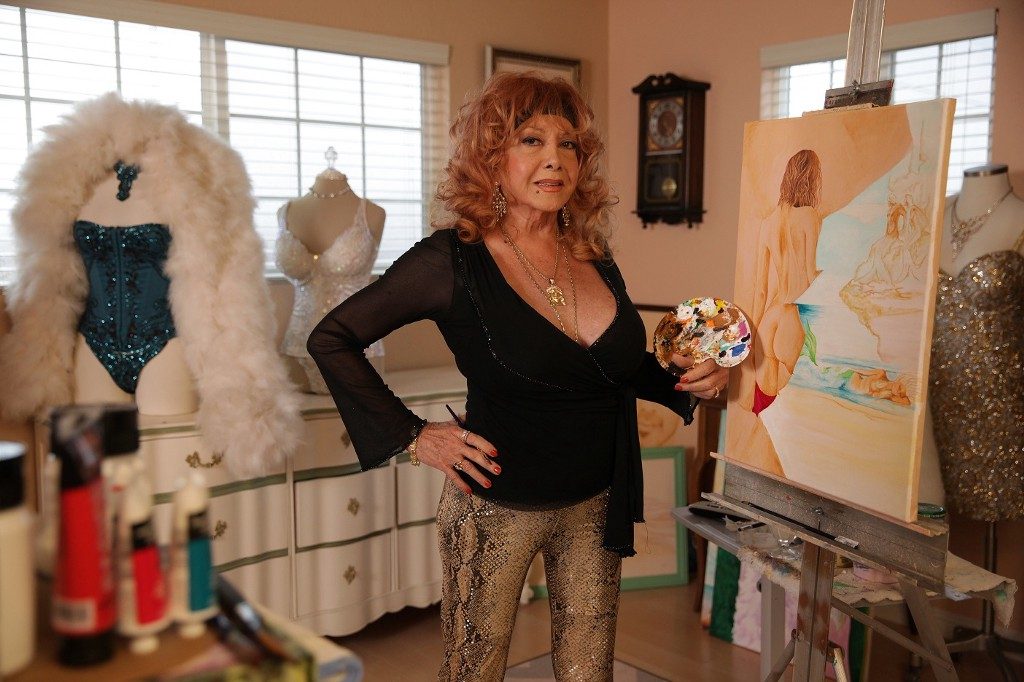Rama Rau is an award-winning writer-director whose credits include cyber bullying doc “No Place to Hide: The Rehtaeh Parsons Story” (2015), which had its world premiere at Hot Docs and was among the Top 20 Audience Awards, and the dramatic short film “Aftermath,” a poetic look into the horror of the terrorist attack in Mumbai, which debuted at the 2011 Cannes Film Festival. Her feature documentary “The Market” (2010) garnered two Canadian Screen Award nominations.
“League of Exotique Dancers” will premiere at the 2016 Hot Docs Film Festival on April 28.
W&H: Describe the film for us in your own words.
RR: My film is a love song to womanhood. In all its beauty, courage, sagginess, crankiness, and joy. I think older women are women who have run with the wolves and I love hearing their stories — and because the women in my film were once Legends of Burlesque, boy did they have stories to tell!
W&H: What drew you to this story?
RR: When I first heard that older women who were Legends of Burlesque during the 40s through to the 70s still gather at the Burlesque Hall of Fame in Las Vegas and perform, I knew this is a story I want to tell.
I knew that with a story like this, I could layer it with concepts of feminism, sexuality, exploitation, addiction, and vintage gorgeousness and just revel in that world, and make my audience re-live that golden era of burlesque that must have been so glamorous and yet we see the darker side too.
W&H: What do you want people to think about when they are leaving the theater?
RR: I want people to laugh, shake their heads, and shimmy all at the same time. Because that’s what life is about — the good and the bad, the sadness and joy. The inevitability of aging gets so much more interesting if you have an edge like these women.
W&H: What was the biggest challenge in making the film?
RR: The biggest challenge in making this film was to get some of the women to allow me to film their stories. Other than that, I think our big challenge was to find archival footage of them when they were young, but we did manage to find material.
W&H: How did you get your film funded? Share some insights into how you got the film made.
RR: Our main funder in Canada was CBC’s Documentary Channel. Producer Ed Barreveld of Storyline Entertainment did an amazing job putting together the funding for this film — his skill is in seeing the potential in projects and finding the right homes for it, all over the world. Ed and I have worked on this and other films together and he is the perfect producer for a film like this, which has an international untapped audience.
We pitched the film as an “alternative history of feminism” and we used to have the classic great pitch: We’d meet a funder, show him our trailer and he’d shut the laptop and say, “How much?” This is how we raised money to make this film and it was a fantastic experience working with Ed on pitching it to various funders.
W&H: What’s the biggest misconception about you and your work?
RR: The biggest misconception about me would be that I can make only Indian films because I have an Indian heritage, though I’ve lived in Canada the past decade and more. If the story moves me, I will make it.
W&H: What’s the best and worst advice you’ve received?
RR: Best advice: Tell your own story.
Worst advice: Be a producer and director. I think one should focus on one’s skills and hone that. Don’t try to be too many things at the same time.
W&H: What advice do you have for other female directors?
RR: Tell your own stories. For a million “nos” there’s always one “yes.” Look for that one “yes.” It’s okay to laugh, cry, get mad, and get moved by things — you don’t ever have to be “like a man” to get a film made.
W&H: Name your favorite woman-directed film and why.
RR: Claire Denis’ “Beau Travail.”
The film is set in Djibouti, Africa and has a saturated, dream-like quality I love. The songs are primal and the whole film is shot with a lot of homoerotic scenes — the sheer beauty of the human body is something every director dreams of capturing.







